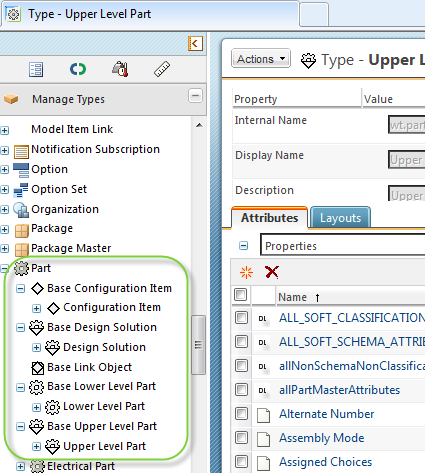Defining Part Subtypes and Relationship Constraints
The five base part types shown in the image below are included with the option
Windchill Aerospace & Defense Module Configuration Items and Design Solutions and appear in the
Type and Attribute Management utility:
Part Subtypes
For each base part type included with
Windchill Aerospace & Defense Module Configuration Items and Design Solutions, a corresponding subtype is provided to define how the system handles the parts assigned to those types. You can use these out-of-the-box subtypes from the
Configuration Management Objects: Windchill Parts topic or create your own subtype under the base type.
Although not required, it is recommended that a new part subtype is assigned a structure-level attribute that corresponds to the base part type that is its parent type. For example, a new part subtype of the Base Configuration Item type should be assigned a Configuration Item structure-level property value. Additionally, relationship constraints must be defined for a new subtype.
For detailed steps on creating a subtype, see
Creating a New Subtype. Additionally, consider the following for
Windchill Aerospace & Defense Module Configuration Items and Design Solutions:
• If you change the Structure Level property, all existing instances of the part type are affected by the change.
| You cannot change the Structure Level property of a subtype if there are relationship constraints specified for it. |
• Set the Instantiable attribute to Yes to allow new parts of the subtype to be created.
• Set the Subtypeable attribute to Yes if you want to create a structure level and not a subtype for an actual part. Subtypes that are specified as being subtypeable are not instantiable, meaning that they are not available from the Type menu in the New Part window. Only parts with a blank Structure Level property value can be subtypeable. This means that if you are creating a configuration item, design solution, link object, or lower level part subtype, the Subtypeable property value must be No.
• Configure
access control rules so that users cannot revise part subtypes with structure-level properties of
Configuration Item or
Link Object.
For more information, see section Structure Level Property in
Configuration Management Objects: Windchill Parts.
Defining Relationship Constraints
The part-usage relationship constraints specify the valid parent-child part types for part usage links. By default, the
Windchill Aerospace & Defense Module Configuration Items and Design Solutions delivers a set of part-usage relationship constraints for the out-of-the-box part subtypes. For more information, see
Configuration Management Objects: Windchill Parts.
If you create new part subtypes, you must define relationship constraints to define parent-child relationships between new part subtypes. These relationship constraints must have structure-level properties that work within the system definitions. Unless otherwise specified, relationship constraints can be specified allowing one or more child types for a part subtype, as long as the structure-level property of all child types is allowed according to the following table:
Configuration Item-Design Solution (CI-DS) Configuration
Structure Level Property of Parent | Allowed Structure Level Property of Child |
Configuration Item | Design Solution | Multiple child subtypes with a Design Solution structure-level property can be defined for a Configuration Item subtype. |
|
Configuration Item-Link Object-Design Solution (CI-LO-DS) Configuration
Structure Level Property of Parent | Structure Level Property of Child |
Configuration Item | Link Object | Only one child subtype with a Link Object structure-level property can be defined for a configuration item. No other subtype can be defined as a child for the Configuration Item subtype. |
|
Link Object | Design Solution |

